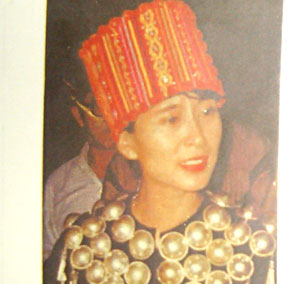Kachin ethnic people hope for a resolution of the ethnic issues after the release of Burma’s pro-democracy leader, Aung San Suu Kyi ...
Kachin ethnic people hope for a resolution of the ethnic issues after the release of Burma’s pro-democracy leader, Aung San Suu Kyi, who is calling for national reconciliation on being freed after 15 years of house arrest.
 Awng Wa, former Kachin student leader during the1988 Democracy Uprising (known as the 8-8-88 Movement) said, the release of Aung San Suu Kyi is cause for great hope for achieving the democratization of Burma.
Awng Wa, former Kachin student leader during the1988 Democracy Uprising (known as the 8-8-88 Movement) said, the release of Aung San Suu Kyi is cause for great hope for achieving the democratization of Burma.
“She will help negotiate between the ethnic minorities and the Burman majority, and will also provide good leadership to the human rights and democracy movement,” said Awng Wa.
Nsang Tu Awng, a member of Kachin Nationals Consultative Assembly said, “Burma’s ethnic problem and democracy problem are the same. If there is democracy in Burma, the ethnic problems can be solved. Conversely, if the ethnic problems are solved, democracy can be restored”.
Duwa Maran Zau Awng, a Kachin member of Suu Kyi’s National League for Democracy (NLD), said since the military coup in Burma there has never been equal rights for ethnic people, especially at the hands of Prime Minister U Nu, and General Ne Win, as they belonged to the Burman ethnic group.
Suu Kyi guaranteed the equal rights of ethnic people when Duwa Zau Awng asked Suu Kyi “whether she can be trusted” by the Kachin people in 2003, according to Duwa Zau Awng.
Former student leader, Awng Wa, said, all ethnic groups will try to organize a second Panglong Conference. They hope it will be more successful if Aung San Suu Kyi is involved.
The Panglong Agreement was signed by Burman leader, Gen. Aung San, (Suu Kyi’s father) and other ethnic leaders from the Shan, Kachin and Chin, on 12 February 1947. It called for the formation of a federal union in Burma, with equal rights and self-determination for the ethnic minorities.
Ms. Shirley Seng, Supervisor of the Kachin Woman’s Association-Thailand (KWAT) said, “We need tripartite dialogue first, followed by peace and democracy - then try to fulfill the Panglong Agreement. That will be the best solution for the country.”
However, Malaysia based Kachin political activists, Nhkum La Seng, said, Kachin people should believe in themselves rather than hoping in Aung San Suu Kyi. She is the best hope for changing the country and for ethnic people. However, nobody knows when she will be detained by the junta again.
“We ethnic people should stand on our own in Burma and on the international political stage. The release of Suu Kyi is a good thing for the NLD, but we don’t know yet what she can do for us. We should not expect so much from one individual,” La Seng said.
Mahkaw Hkun Sa, General Secretary of the Kachin National Organization (KNO), said, they still don’t know how she will lead the people or what she can do for ethnic people, as far as improving the human rights situation in Burma.
“If there is practical tripartite dialogue, then there is hope for ethnic people,” said Tangbau Aung Di, the General Secretary of the Kachin Literature and Cultural Committee, of the Kachin Independence Organization (KIO).
The United Nations supports the call to solve Burma’s political issues through tripartite dialogue between the current military rulers, the political opposition and ethnic groups.


